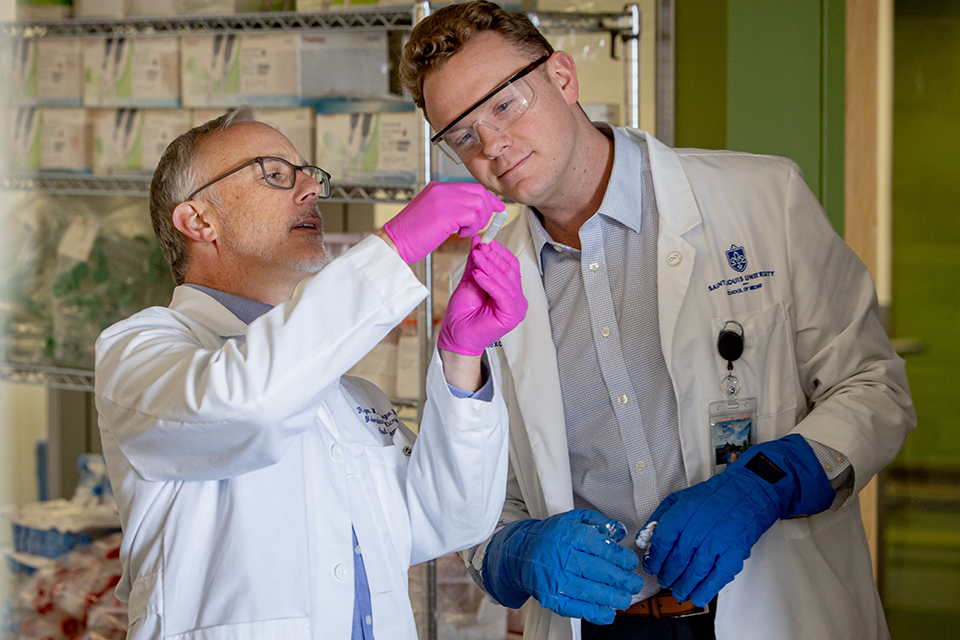SLU Study: Immune Dysfunction Increases Cancer Risk in Obese Populations
11/14/2024
ST. LOUIS —Researchers at Saint Louis University’s School of Medicine say T-cell dysfunction is leading to an increased risk of cancer in obese populations.
T cells are white blood cells called lymphocytes essential to your immune system in the fight against infections and cancer. Ryan Teague, Ph.D., professor of molecular microbiology and immunology at SLU, and his team are exploring why obesity impacts T-cell dysfunction and compromises immune surveillance, or the body’s ability to survey malignant cells and clear them before they become tumors.

Ryan Teague, Ph.D., left, and Alex Piening, an M.D./Ph.D. graduate student at SLU, work in the lab in Doisy Research Center on October 21, 2024. Photo by Sarah Conroy.
The study, which was led by Teague and co-authored by Alex Piening, an M.D./Ph.D. graduate student at SLU, was recently published in Nature Communications, found that T-cell dysfunction linked to obesity prevented T cells from detecting tumor cells, placing obese mice at higher risk of developing tumors when exposed to a carcinogen. Teague and his team are now trying to uncover the exact mechanism underlying the metabolic dysfunctions associated with obesity that directly impact T-cell function.
Ongoing projects in Teague’s lab at SLU are designed to identify barriers to successful cancer immunotherapy and develop strategies to overcome these barriers for improved patient outcomes. Teague and his team investigate how obesity impacts the efficacy of immunotherapies.
"Immunotherapy boosts a patient's immune system by targeting T cells and reinvigorating them. Paradoxically, immunotherapy is often more successful in patients with obesity, where the immune system isn’t functioning quite as well," Teague said. "Our research explains this paradox by showing that in the setting of obesity, developing tumors are only required to escape a weakened immune system. Such outgrown tumors are not well adapted to evade the reinvigorated T cells elicited during immunotherapy, and thus, are more easily destroyed."
Teague said single-cell RNA sequencing played a critical role in the study’s findings, which allowed scientists to learn what’s happening inside individual immune cells within tumors.
"We learned that the dysfunction in these T cells lies in their inability to kill tumors. Those genes were not being turned on. It also lies in their inability to acquire the metabolic functions needed to sustain anti-tumor activity," Teague said.
Thanks to SLU’s investment in single-cell RNA sequencing technology, the Department of Molecular Microbiology and Immunology has leveraged this new approach to advance its work studying cancer and the immune system, bringing us closer to new cures.
Other authors include Kelly D. Pyles, Kyle S. McCommis, Ph.D., Department of Biochemistry and Molecular Biology, Saint Louis University School of Medicine; Emily Ebert, Carter Gottlieb, Niloufar Khojandi, Lindsey M. Kuehm, Stella G. Hoft, Richard J. DiPaolo, Ph.D., Stephen T. Ferris, Ph.D., Elise Alspach, Ph.D., Department of Molecular Microbiology and Immunology, Saint Louis University School of Medicine.
Latest Newslink
- SLU Students Compete in a Battle of the BridgesSLU Science and Engineering students tested their engineering skills in a timed innovation challenge building bridges out of cardboard tubes and duct tape.
- SLU to Hold GIS Day November 20Saint Louis University will host GIS (Geographic Information System) Day on Wednesday, Nov. 20. The one-day conference will feature speakers who work on GIS projects in the St. Louis region.
- SLU Study Explores the Pandemic’s Impact on Breastfeeding Practices in Historically Marginalized CommunitiesThe study, recently published in the Maternal and Child Health Journal, found that 34% of mothers said stay-at-home orders facilitated easier breastfeeding at home, stronger mother-child bonding, and extended breastfeeding duration for many women. However, the pandemic also presented significant barriers, including limited access to lactation support and heightened maternal stress.
- Two New Exhibitions Opening at Saint Louis University Museum of ArtSaint Louis University Museum of Art (SLUMA) opens The Past Beneath Our Feet and Renaissance Man on Friday, Nov. 15. "The Past Beneath Our Feet" presents findings from two decades of exploration in Ireland by SLU professor Thomas Finan, Ph.D. "Renaissance Man" presents selected works by the Honorable Nathan B. Young Jr.
- Two SLU Faculty Members Receive Emerson's Excellence in Teaching AwardTwo Saint Louis University faculty members received Emerson's 2024 Excellence in Teaching Award. Jennifer Buehler, Ph.D. (Education) and Christina Garcia, Ph.D. (Spanish) were both recognized for their teaching prowess. The Emerson Excellence in Teaching Awards Program recognizes educators in the St. Louis metropolitan area annually for their leadership in and passion for teaching, their contributions to student learning, and their knowledge and creativity.
- Chaifetz Center for Entrepreneurship Names Two to Entrepreneurship Hall of FameThe Chaifetz Center for Entrepreneurship at Saint Louis University inducted two new members to its Entrepreneurship Hall of Fame at a dinner on Friday, Nov. 8, at the Richard A. Chaifetz School of Business.













